He’s planted one of the biggest churches in the UK. If we want to see revival come, it’s time we took prayer and fasting seriously, but not religiously, says Pastor Agu. When we do, the rest will fall into place
There are many things that are larger-than-life about Pastor Agu Irukwu. At 6ft 5in tall, the Nigerian-born father-of-three leads one of the UK’s largest churches, Jesus House for All Nations. The congregation in north London began nearly 30 years ago with just 33 people, but grew to almost 3,000 people before Covid.
Until recently, Pastor Agu also oversaw the UK branch of the Redeemed Christian Church of God (RCCG), a Black majority church network that is among the fastest- growing denominations in the nation. In 2011, he was voted the “most inspirational black man” by London’s Metro newspaper, and has held senior roles at the Evangelical Alliance (EA) and Festival of Life, the all-night prayer meeting at London’s ExCeL centre that gathers as many as 40,000 worshippers.
I met Pastor Agu at a conference that is also very large, the Alliance for Responsible Citizenship (ARC). The inaugural meeting brought together world leaders to discuss the biggest issues facing Western societies. Pastor Agu is on ARC’s advisory board and appeared on the main stage alongside other notable figures, including the Catholic bishop Robert Barron and psychologist Jordan Peterson.
Despite his impressive CV, one thing that does not seem large about Pastor Agu is his ego. Often, well-known church pastors are eager to promote their books or their church’s latest programme in interviews, but Pastor Agu is most enthused when speaking about prayer, revival and – especially – his wife. He is also passionate about social action and the transformation of society. Once, he wanted to change the world through politics. Now he seeks to do so through the Church.
Born into a wealthy Nigerian family, Agu trained as a lawyer in the UK before returning to Africa to work in investment banking. But after his dormant Anglican faith was brought alive in a vibrant Pentecostal church in Lagos, he became a pastor with RCCG and was offered a role at a new church in north London. He may come from a privileged background, but he has not been immune to trials. His first wife, Ify, died aged 40 when their two children were just ten and twelve. His eldest son, now 29, also suffered a life-threatening illness, which Pastor Agu credits both God and medical experts with curing.
Agu has pastored through a time in which the Church in Africa has seen exponential growth. During the same period, the UK Church has shrunk just as rapidly and, had it not been for migrants from the majority world boosting numbers, this decline would be even sharper. Recent research from the EA’s Talking Jesus project found that 25 per cent of church attendees in the UK are people of colour. British African churches are, as journalist Tomiwa Owolade said recently, where some of the most “vigorous” Christian faith is found. Perhaps it’s time for the British Church to ask: “What can we learn from our African brothers and sisters?”
You had quite a radical conversion in the 1990s. Can you tell us about that?
I was born into a Christian home, and I went to church now and again to please my mother, on Easter Sunday, Christmas and stuff like that. When I started searching, it was a very interesting period in my life. I was making more money than a young man has any right to make, and had a very hectic social life. In a sense, all was good. But there was something missing, which I couldn’t put my finger on. In the quieter moments, I would wonder: What exactly is not right? But I didn’t think it could be to do with my faith, because I thought: I’m [already] a Christian.
My late wife, who then was just a friend, pointed me in the direction of this church. I was thoroughbred Anglican; I’d never been into a Pentecostal church. I’d never seen so many young, happy people in church.
Political correctness has gone way overboard
I’d never heard music or preaching like that. I quickly figured that the whole thing centred around the Bible, so I asked my late wife if she could get me one. I was a Christian but I didn’t have a Bible – that tells you the state of my Christianity!
It was very dramatic for those around me. Most people thought I’d lost my mind because it was a very radical change.
I got increasingly involved in church and I found fulfilment. From a very young age, I wanted to help people. Going into investment banking was really to raise resources so that I could go into politics, to bring change. I found that what I wanted to do – serve people, help people, touch people’s lives – I was doing in church.
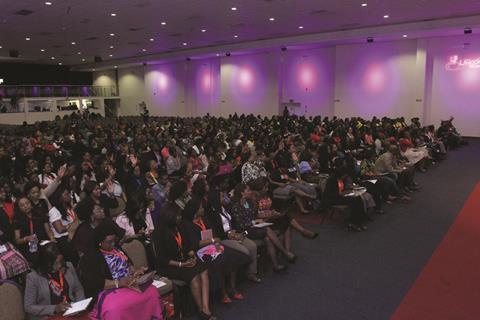
What has most helped you to grow spiritually?
If there’s one thing I would commend to any Christian, it would be to develop a strong prayer life. It’s the crucible of our relationship with God; everything comes out of that. I try to get people not to see prayer as a ‘thing’, but as the outworking of a relationship. And if you spend time with God, all the rest falls into place.
We must expect to be attacked if we’re standing on the truth
What does your prayer life look like? Are you disciplined, or is it more when you feel the Spirit move you?
God works with us, to a large extent, through our personalities – which he has given us. My wife, Sola, is a very disciplined, very meticulous person. You can set your clock by Sola’s prayer life. She would not miss an appointment with God. She’s up early, she’s very ordered, she has prayer journals. I’m not like that…So there’s a bit of flexibility in my prayer life.
But it sounds like a living relationship with God is important to you.
Yeah, very important. It’s not a religious thing. It’s a relationship thing. Let’s not put prayer in a religious box. You can pray on your knees, by your bedside – you can also pray on the Tube. You can pray when you swim, like I do. It’s God being central to our lives and us being able to talk to God about anything and everything.
A big part of your ministry has been encouraging men in the faith. How important do you think that is to our society at the moment? And how concerned are you about the epidemic of fatherlessness?
It’s very important. I wouldn’t say it is more important than ministry to women – God doesn’t put the man above the woman. God is very clear: “male and female he created them” [Genesis 1:27] and they have the same level.
Society has confused many men. We must put a clearer picture before them of who they are, what their responsibilities are – especially to women and to children, either as friends or fathers. I pastor a church, and the women throw themselves forward to serve. From the minute they’re in the church, [they say]: “What can I do? Where can I help?” But the men will sit and watch for a while. So we’ve got to be on the front foot in engaging them and encouraging them to serve.
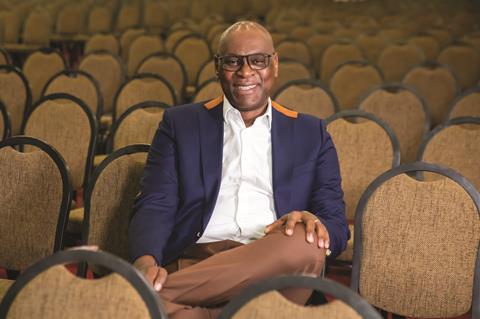
You are passionate about revival. What are your dreams for the UK?
The kingdom just has to come…the message that John the Baptist announced is actually a wake-up call for the Church and for us, as Christians, to get out there and live the message of the kingdom. Because the most effective way of preaching it is to live it, so that people encounter the kingdom through you.
Are there any particular social issues that you’re especially passionate about addressing?
I don’t even know where to start. That tells you how bad things are. I mean, you could start [with] poverty, which is very dear to my heart, because I’m also Nigerian and, in Africa, poverty stares you in the face.
The spirit of the culture that we now find ourselves dealing with – the toxicity, the lack of tolerance, the cancel culture – you see certain expressions that are vicious; wicked almost. And you wonder: Where did this come from? It wasn’t like this ten years ago.
You can’t run away from the whole debate around sexuality. They are not complex things if we deal with them in a kingdom way. If we’re tolerant, respectful, if our language has kindness in it, if we agree to disagree and respect each person’s position, these things are not as complex. It only becomes toxic and complex when we throw that out of the window, and say: “You must endorse my position and, if you don’t, you’re the enemy.” That’s where the whole thing falls apart.
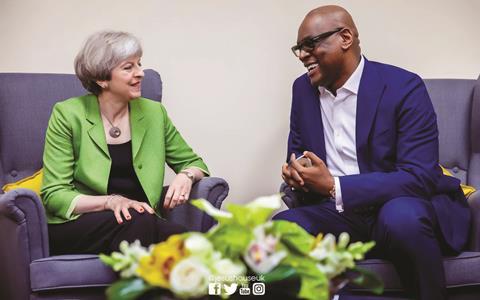
When Labour leader, Keir Starmer, and former prime minister Theresa May visited you, some parts of the media said they shouldn’t be endorsing a “homophobic preacher” due to your orthodox views on marriage and sexuality. How did you deal with that?
I think in our time, it is an occupational hazard. We must accept that there will be some measure of persecution. When we compare it with what is going on in Somalia, northern Nigeria, Pakistan or India, it pales into insignificance.
So if [the media] write a few things about you, call you a few names and you get some letters that have vicious words in them, it’s OK, compared to someone whose wife has been beheaded in front of him, or whose children are excluded from school because they serve Jesus.
If we’re going to stand on the truth, then we must expect that there will be some attacks.
You can’t ignore the Black Church; it’s the fastest-growing part of the church. So [politicians] are gonna have to engage with us somehow, because elections turn on numbers. And we have numbers. The Black Church is a sleeping giant; if it wakes up, its influence is significant. I would say to [politicians and the media]: “Let’s arrive at a place where I respect your position, you respect my position and we agree to disagree on certain issues.” At least we can agree on fundamentals in terms of the kind of society that we want.
Many Christians who’ve lost their jobs for expressing views about LGBT issues come from the Black African community. Do you think you’re unfairly discriminated against?
Whether Black, white or Asian, if you stand on the truth, the colour of your skin doesn’t matter. We are going to get persecuted for that.
We live in a world where everything is deconstructed now. [People] want us to believe that there isn’t any truth but some of us are saying: “If we go down that route, this whole thing is going to collapse.” There must be certain things that are the truth. So yeah, we will stand on it. And you’ll get shot at, you get knocked a bit. But it’s OK.
Our prayer life is the crucible of our relationship with God; everything comes out of that
Sometimes people from the West can be a bit more nervous about talking about Jesus explicitly. Do we need to have more confidence in preaching the gospel?
I think so…we couldn’t get a better example than the early Church. The boldness of early Christians caused the spread of the gospel. Sometimes they lost their lives, but I think the Church needs a dose of that. Political correctness has gone way overboard. The truth should be spoken. I think it should be spoken with kindness. I think it is wise to be sensitive to people. But I don’t think that should water down the truth. I should be able to declare: “I’m a Christian, I’m a lover of Jesus” freely, no matter the setting.
It seems as though there is a lot the Church in the West can learn from the African Church, where there has been rapid growth and a lively faith.
We can learn a lot from the Church here [in the West] – areas like theology, governance. But there is also a lot to learn from the developing parts of the world where churches are growing, not just Africa. A commitment to prayer and the belief that God does answer prayer – that is deeply embedded in [African] Church culture.
You can’t run away from the encouragement that the Bible gives us to fast, which hardly exists in a lot of Western churches. Believing that there is nothing God can’t do, and being full of hope for tomorrow, no matter how bad today is – it’s very upbeat in that regard.
I am not saying there are no bold, courageous Christians in the West but, as a whole, the African Church culture takes massive steps of faith. The beauty is when [the two cultures] rub off on each other; what it produces is so beautiful.
To hear the full interview, listen to Premier Christian Radio at 8pm on Saturday 13 January, or download ‘The Profile’ podcast premier.plus/theprofile
Photos (c) Hazel Thompson













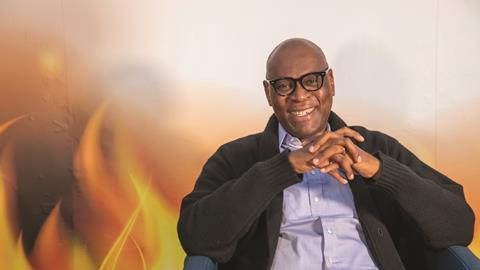

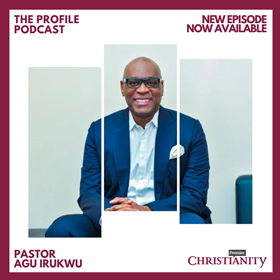

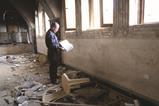





















No comments yet